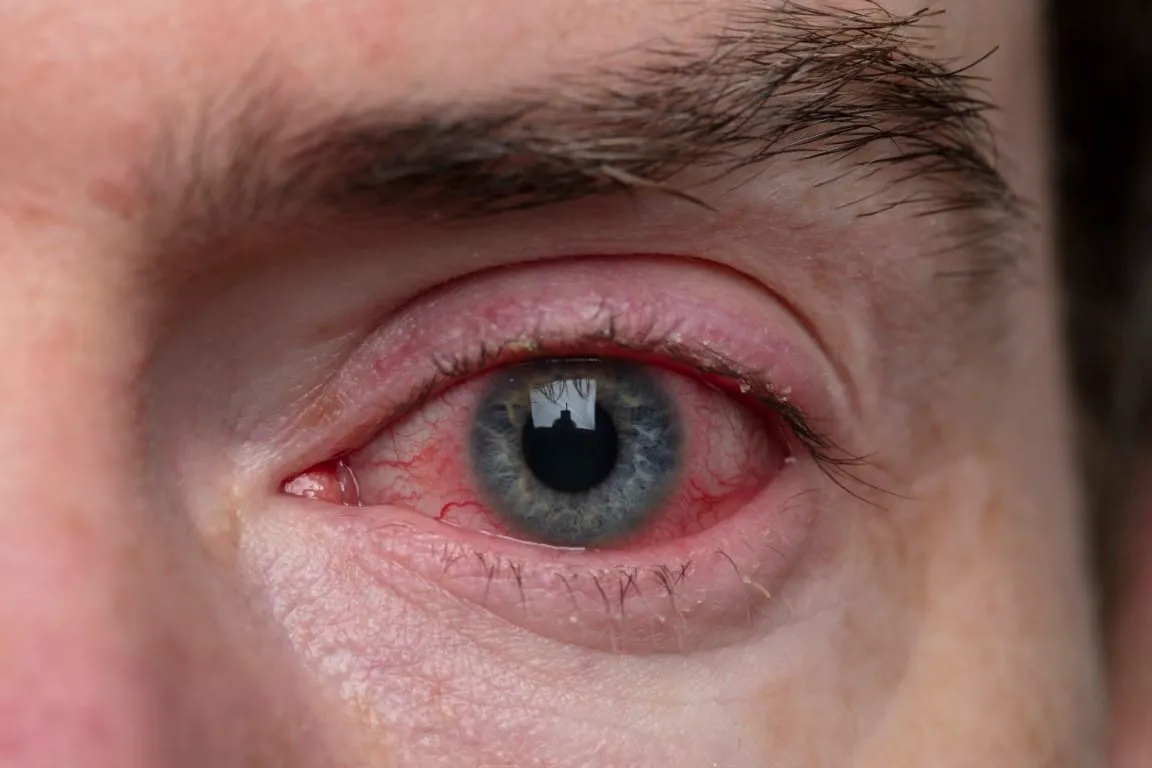The effusion in the eye, also called subconjunctival haemorrhage or hyposphagmaappears when there is a rupture in one or more capillaries and blood accumulates under the conjunctiva; as the conjunctiva is transparent, the blood appears red, just as it is.
Although ocular effusion is a benign process, as the eye reabsorbs this small amount of blood and does not affect vision, when it appears after trauma or is very profuse, it is necessary to see a professional ophthalmologist to rule out that it is something more serious and the bleeding is a warning sign.
What is an ocular effusion?
An ocular effusion is a slight bleeding under the conjunctiva.. The contrast of the blood with the white colour of the tissue usually causes great alarm to the patient. The extent of the bleeding may vary from a small, almost imperceptible spot to a noticeable extent, but if it is a simple effusion, vision should not be affected and the bleeding should be localised.
In most cases, the effusion occurs after trauma to the eye, the impact of a small solid particle blown by the wind on an eyelid that has failed to close in time, or the bad habit of rubbing the eyes.
But bleeding can be a warning sign of blood pressure problems, or of an open wound in the eye itself, so it is not advisable to think only of fortuitous causes. If there is discharge from the eye with a headache, we should pay attention, even if we have created a false alarm.
How do you know if you have an eye effusion?
Et is the patient who first detects the presence of an effusion.. One morning you wake up and, without noticing anything strange, when you look in the mirror you are startled by a more or less large red spot that covers part of the whitish area. At other times, after an impact, a small spot appears and grows as the minutes or hours go by.
It should be stressed that the causes of ocular effusion are diverse, and the effusion itself is benign. Sometimes, as we shall see, it can even be predictable, which does not mean that it does not require consultation.
Causes of eye effusion: why does it occur?
In order to be able to distinguish with certainty the causes of effusion in a patient's eye, it may be necessary to perform a non-invasive diagnostic test, such as ocular ultrasound. This is why it is important not only to seek the advice of an ophthalmologist, but also to make sure that he or she has the necessary diagnostic equipment, as is the case at our ophthalmology clinic.
Trauma
It is the most frequent cause of eye effusion and which is usually of no importance, except in the case of open wounds or major impacts.
Sometimes the patient wakes up with a small effusion because, as mentioned above, they have rubbed their eyes with some force, perhaps during sleep. Other times they are able to establish when the impact occurred, which may be accompanied by discomfort such as tearing or reddening of the eye.
Viral infections
Infectious processes affecting the eyes may favour the appearance of effusions, but there are also diseases in which eye bleeding is a symptom. In the latter cases, these are not eye effusions but more or less persistent haemorrhages, although we understand that as a patient you may not be able to tell the difference. Don't worry, we can.
Stress-related ocular effusion
There is a popular belief that stress can cause stroke. In reality it is not a question of stress or anxiety, but of sudden changes in blood pressure. Here we should consider anything from a nervous breakdown to a bad cold.
Valsalva manoeuvres.
Manoeuvres such as coughing or vomiting can increase the pressure in the veins and lead to rupture. This is a common cause that is not important.
Stroke in an eye that has recently undergone laser surgery
When you undergo eye surgery there is a risk of effusion during the days following the operation. In the case of laser surgery, the risk is greater, but we are talking about benign effusions. Nevertheless, be sure to inform your ophthalmologist.
Eye spills that are accompanied by other spills
When the eye effusion is accompanied by other effusions, on the face or elsewhere on the body, you should consult a doctor immediately.
There are circumstances in which these generalised strokes are due to taking certain medications, especially anticoagulants. Some commonly used anti-inflammatory drugs may worsen an effusion if taken at the same time as the episode.
Treatment of an eye effusion
In reality, the effusion in the eye no is treatable because the blood is reabsorbed by the body within a few days. What is important is to distinguish whether this is a benign, sporadic effusion or a symptom of another problem.
When eye effusion is a symptom, the patient is treated for the causative disease or the medication is readjusted if it is the cause of the effusion. In these cases and when there is a severe vascular disorder, subconjunctival haemorrhage is not the main issue.
When bleeding occurs due to the impact of a particle on the sclera or an infection, your ophthalmologist may prescribe some treatments to alleviate symptoms that are not caused by the effusion itself, but by tissue damage. Sometimes artificial tears are used for a few days, or continuously in the case of dry eye, and prophylactic use of an antibiotic may be advisable.
We say that there has been an effusion in the eye when a capillary breaks and a slight bleeding appears. An effusion should not cause discomfort such as generalised redness or eye pain, although these symptoms may appear when the effusion is associated with diseases, some of which are serious.
As a precaution, we recommend that you always consult an ophthalmologist if you suffer from frequent effusions or if you remember that yours was due to a major trauma. If it is not just an effusion, it may be necessary to carry out a series of tests to find out the real condition of the eye.



